- Home
- Kim Newman
The Night Mayor Page 10
The Night Mayor Read online
Page 10
For now, she’d have to leave Tunney to his own problems and go after Daine.
Over the smart street clothes Dr Groome had come up with, she wore a transparent raincoat. She must look like a cellophane-wrapped sweet. A hard-boiled sweet. She checked her lipstick in the cab’s mirror. Her face had come out more like Ella Raines than Gene Tierney. Too thin-lipped for high-gloss romance, but pretty in a hard-edged, sparkly fashion. She would have to get used to the way she looked in black and white.
In the short time she had been in the City, she had been propositioned by a well-dressed lush, witnessed a gangland execution and been pursued through a deserted subway station by a bulky killer. This would take some getting used to.
The Princetown psychs had simply lost track of Tunney. They had monitored him as far as Poverty Row, then the Dream had upside-downed. A major shadow reality shift. This place looked solid enough from the inside, but it could change as quickly as your mind.
Susan Bishopric, assassin. That was a new paragraph for her curriculum vitae. Kill Truro Daine. In this Dream, that was tantamount to putting out a contract on God. But God makes mistakes. Ask Job. Daine had been caught and convicted back in the real world. That would put a dent in his omnipotence. Even here.
Dreaming herself into the City had been easy. Dr Groome had hooked Susan up to Yggdrasil and floated her in the third tank. Trefusis had wished her luck, Juliet had told her to shoot straight, and the psych techs had tried not to look her in the eyes. Then she had descended through the familiar outer layers of Dreamspace, and faded in on the bus.
She found to her surprise that she didn’t mind the clothes. Whenever she Dreamed historical, she always assumed multiple garments would be uncomfortable and cumbersome, like a non-protective flakjak. Actually, she quite liked nylons, padded shoulders and her hat. And pockets were a revelation. Her gun hung heavy in her suit coat, resting cool against her hip. She put a hand in her pocket and felt the grip of the weapon. Juliet had given her a few pointers, but indream Susan found her experience as Vanessa Vail somehow more confidence-building. Vanessa could shoot the eye out of a gnat at fifty paces. Susan hoped the skill would come back to her if it came to guns.
Cook drove clumsily, keeping up a constant stream of chatter. Susan volumed him down. Poor little chump. Tired eyes flashing in the rearview mirror, childish enthusiasm bubbling over. He was marked for a fade-out long before the finish. Susan couldn’t think of a film where he had made it alive to the end credits.
The cab paused at an intersection to give right of way to a car chase. Edward G. Robinson careened down Elm Street and screech-turned onto Sunset Boulevard. The only things holding his stolen sedan together were bulletholes. Lieutenant Ward Bond was at the wheel of the police convertible hot on his tail. Detective Van Heflin stood up in the car, hat clamped to his head, firing his tommy gun from the hip.
‘He killed a dame,’ explained Cook, ‘strangled her with a string of pearls. The cops will get him. Nobody gets away with murder in this City.’
‘There’s always a first time.’
Experimentally, she flicked the cold steel safety catch on and off in her pocket. She was wearing a groove in her thumb.
What to do next? Hole up, hide out, get the measure of the Dream. Then start feeding in a few amendments. That would offbalance Daine. She was certain she could make some substantial changes. Perhaps Daine wouldn’t like what she was planning for his self-designed afterlife. She concentrated on the interior doorhandles of the cab and changed their design several times, just for practice, then smoothed them out entirely. No problem.
Should she try to get in touch with Tunney again? He was stuck in the City somewhere. The tentative diagnosis was that he had been too close to Daine’s fantasies and been subsumed into the structure of the Dream. Deep down, he had felt too much at home in the City to want to see it deleted from the Yggdrasil file.
All this might have the makings of a Prix Italia memoir. There were very few Dreams about Dreams and Dreaming. But first, she would have to come through it alive (relatively easy: keep repeating, none of this is real, it’s only a Dream) and sane (a horse of a different colour: like in The Wizard of Oz)…
She looked down at her feet, and ruby slippers briefly superimposed on her patent-leather pumps. Follow the Yellow Brick Road! Follow the Yellow Brick Road… Stop!
That had been bothering her since she hit the City. Was her own brain kinking her around, or was Daine trying to tie her mental patterns in knots? They hadn’t been able to tell her whether he would automatically sense any new presences in his Dream, and lateral thinking was the Dreamer’s occupational disease. Irrelevant associations dredged out of the mind’s mire of trace memories, subconscious detritus and stamped-on feelings. There was only one cure: reality. Of which there was precisely none about. She would have to put up with occasional Sinatra-outs until she was out of the tank.
Outside an elevated railroad station men in raincoats with collars turned up and hats with brims snapped down bustled busily, coming from and going to nowhere in particular. Robert Walker, a soldier in uniform, was fighting his way through the crowd, a bunch of flowers and a marriage licence in his hand, wading against the human tide to the shining spot under the clock where Judy Garland stood, dressed in angelic white that stood out against the drab extras, waiting anxiously. Susan checked the clock. It was two thirty. Down the road a little, a streetlamp spotlit a grubby newsstand.
Cook idled the cab.
‘Extree! Extree!’ cried the freckle-faced Mickey Rooney. ‘Private eye wanted for murder! Extree! Extree!’
‘Hold on here a minute.’
‘Sure, sister. I got all night.’
Susan reached for the doorhandle and found only smooth upholstery. She flipped her mind and the handle came back, a size or two too large. She opened the door, slipped the hood of her see-through up over her hat and stepped into the rain.
The newsboy, cap turned backwards, waved his paper in the air, still shouting.
‘Can I have an Inquirer?’
‘For def, doll.’ He pulled a paper off his stand and accepted some small change. ‘By the way, I get off in half an hour.’
‘Fresh.’
‘As eggs,’ Rooney grinned and nervously ran a wet hand under his cap, smoothing his tousled hair.
Susan stood under an awning and read the extra.
Banner headline: PRIVATE EYE WANTED FOR MURDER! Smaller-type captions: ‘Philanthropist Truro Daine Still Dead. Enquiry Agent Richie Quick Wanted by Police. “No Statement at This Time,” Says Commissioner Neil Hamilton. “We’ll Fry the Rat Yet!” Vows Chief of Detectives Barton MacLane.’
There was a picture of Daine doing the samba at a nightclub, and a grainy passpic of Tom Tunney passed off as Richie Quick. They both looked dead.
The text, after the first one-sentence paragraph, was a jumble of meaningless words. The only other story was a flyer about the war. After the front page, the rest of the paper was blank.
‘Extree! Extree!’ shouted the newsboy, ‘Spine-Snapper Strikes Again. Scotland Yard Baffled! Extree! Extree!’
That paper was for someone else. Susan recognised Basil Rathbone and Nigel Bruce, somehow not quite anachronistic in deerstalker and bowler hat, as they consulted over their extra. Bruce was flustered, but Rathbone seized on a minute clue and rattled off a string of deductions.
‘Ah-ha, Bruce, the clouds part. I do believe this bloody business betrays the involvement of our old friend Professor Lionel Atwill. Evidently the reports of his death in the sewers of Montevideo were exaggerated. The gorilla footprints, the Ecuadorian pygmy poison and the six-fingered alabaster hand are most suggestive. Quick, the game is afoot!’
They hurried off, Rathbone with an excited spring in his step, Bruce huffing and puffing to keep up with him, and passed out of the rain into a street wedged thick with fog. Susan could see a gaslamp vaguely in the murk, and hear the clip of hooves on cobblestones. That was another part of the City.
In the mirror, Cook’s eyes were white marbles. The windshield was a white spiderweb of cracks centring on a neat black circle. There was a matching neat black circle in Cook’s forehead too.
Cliché.
14
Ruger and Rains were our most up-front suspects, so I decided to start with the mystery man of the Cicero Club, George Macready. I knew a little about him. He had come from out of town with a fortune, was known to have been a vociferous Bund supporter before the war and had set up a chain of more or less above-board casinos in the districts where gambling was more or less legal. He had a high-rolling joint on the SS Nocturne, a ship anchored outside the limits, and some nasty rumours had floated back on the tides along with a well-dressed corpse or two. But by far the worst of his establishments was the Noir et Blanc, a palatial clipjoint on the waterfront. Some people said that gambling should be illegal throughout the City. Other people muttered that, the way Macready had it set up, what went on in his places wasn’t really gambling. There were plenty of conflicting stories about the way he got the scar that ran from temple to chin down the right side of his face. None of them were pretty. On the side, he ran an art gallery with Vincent Price, which didn’t sound exactly legitimate either.
Carradine and I decided he was most likely to be in the Noir et Blanc. Besides, neither of us liked the idea of the swim out to the Nocturne. There were sharks out in the bay, and they didn’t get fed often enough. The waterfront was a vile district, further gone even than Chinatown. The worst elements of the Latin Quarter, little Araby, New Haiti and the Occupied Sector flowed together in an open sewer of vice, crime and callousness. Brownstones cosied up to slums, police cars were armoured, and everything was for sale. A row of dubious cafes with misspelled French names huddled together, while the streets were aswarm with vendors hawking bogus curios, limping sailors down on their luck, scuttling coolies with slit eyes and concealed daggers, and pop-eyed black zombies lurching on mysterious missions. I wondered if Anna May Wong had passed this way. Through the squalor threaded a well-guarded street. Limousines slid across the asphalt, decadent thrill-seekers cringing behind their curtained windows. Macready had men posted on the sidewalks to protect his customers’ money on their way to the casino. After they left, they were on their own. We were too hot to take a cab, so we just sauntered along with the crowds.
I was hoping the cops down here would be too busy lining their pockets to pay much attention to the all-points bulletin out on me. We hadn’t seen the National Guard yet. Carradine caught a half-naked Moroccan boy with his hand deep in my pocket, and threw him over a low wall. Dogs barked and snapped, and we heard the sneak thief running barefoot into a maze of alleyways, bomb sites and derelict hotels. I still had my gun and what was left of Sterling Hayden’s money. Perhaps I should try to pick up a little extra at Macready’s tables. Then again, perhaps not. In one of my newspaper clippings, he was quoted as having said, ‘I make my own luck.’ The suicide rate in this quarter was unnaturally high, and the insurance companies had established a definite connection between owing large sums of money to George Macready and accidental death. There was enough blood on the streets down here already. A crowd had gathered around one of the piers, where Marlon Brando and Lee J. Cobb were tearing chunks out of each other with docker’s hooks. We were offered a variety of tempting odds by a rat-faced freak with a clutch of money in one hand and promissory notes in the other. I passed.
‘There,’ said Carradine. The Noir et Blanc was a palace all right, lit up like a carnival float. Flags of all nations hung like gibbeted criminals from a row of poles just under the roof. It was probably an optical illusion, but the place seemed to be flying more eagles and swastikas than stars and stripes. Gargoyles spewed rainwater. Crowds of men and women were swarming up the front steps to the three revolving doors. They looked like sacrifices crushing themselves into the mouths of Moloch. A gigantic neon roulette wheel revolved under the Noir et Blanc sign.
‘Quite a sight, isn’t it?’
We pressed into the throng and allowed ourselves to be sucked forwards, up the steps. I wasn’t sure that our clothing would pass muster at the doors, but others in the crowd were even more outlandish and uncivilised. I saw the major-domo turn away a couple weighed down with medal ribbons and jewels, while admitting a fat young man in a greasy fez and ragged robe. We were let through with barely a curled lip, and found ourselves in a foyer hardly smaller than a pyramid. It would have been a good place to hold a torchlight rally. Macready must have enlisted the services of Cecil B. DeMille as an architect. The place was done up in his trademarked colossal style, with a huge pair of well-muscled stone legs standing astride the doorway to the main casino. The ceiling, inconceivably far above our heads and leprous with chandeliers, cut off the legs at mid-thigh. I had the impression the statue extended through the upper floors. The gigantically helmeted head of some biblical hero would stick out through the roof and stand like an Easter Island monolith among the chimneys and machine-gun emplacements, jewelled eyes blazing with golem life.
We held on to our coats for fear of never seeing them again, and mingled with the doomed souls. Doors five times the height of the average giraffe opened between the statue’s ankles, and the latest intake of victims were swept inside. We went along with them.
The central cavern of the Noir et Blanc was the gambling hell Dante might have designed. The roulette wheels were sunk in circular pits. The most irredeemably damned, in their white dinner jackets and turbans or strapless black sheaths and dripping jewellery, clogged up the lower circles, dropping chips onto the grid as if casting swill to the pigs. At the very lowest level, a wheel fully twelve feet across was spun by a pair of mountainous Turkish wrestlers in tiny loincloths, while a bent and crippled croupier, Mischa Auer, shrieked numbers at the losers. People had been trampled to the floor around the wheel. Auer was suspended in a hanging basket, his dead legs dangling beneath him, reaching out with a surreally long scoop to dredge the chips into a central sinkhole. A girl lunged over the grid, screaming that she had made a mistake, fingers just missing the disappearing chips. One of the wrestlers tipped her up by her ankles, and she too vanished into the hole, high-heeled pumps kicking as she was swallowed by whatever machine or animal lurked below. The wheel kept spinning, the damned kept pouring away their money.
The higher tiers housed lesser wheels, chemin de fer, blackjack, slot machines, vingt-et-un, baccarat, five-card stud. Stricken friends and dangerous parasites, penniless would-be gamblers seeking a vicarious thrill and subtle pickpockets in the pay of the house mingled with the addicts. Silent orientals passed among the clientele, serving drinks and notes of credit. Two czarist officers, bulky in their comic-opera uniforms, solemnly played Russian roulette, each downing a drink every time the firing pin of their revolver came down on an empty chamber. The din was intolerable: overlapping dialogue in several languages, dowagers with laughter like painted nails down a blackboard, the endless rattle of the wheels, occasional gunshots, screams of unknown origin, the gravel-under-waves chink of piles of money turning over again and again, the shouts of losers. And somewhere, behind it all, a bland jazz band. One of the White Russians lost and the other drained a blood-spattered glass, his hand shaking as he collected his winnings.
‘That’s the Count Charles Boyer,’ said Carradine, pointing at an impassive, middle-aged man who was throwing a fistful of ribbon-bound documents onto a table. ‘He’s trying to gamble away his estate before it falls to the Nazis, but his lifelong losing streak has changed. He keeps winning.’
‘A sad story.’
‘All stories here are sad.’
We worked our way around the central tier, hands in pockets, and came out in an ornamental garden open to the stars. A glass roof, hundreds of feet above us, kept out the rain. There was a mercury pool for losers to reflect in while they blew their brains out. The staff were just removing the latest crop of bodies. Cu
rt Bois was filling a bucket with rings, watches and empty wallets.
‘Macready will be upstairs,’ I said. ‘Let’s go quietly.’
We found ourselves in a hall where a masked ball was in progress. Streamers flew through the air, revellers contorted to the music. There was a vaguely medieval theme: knights and ladies, fools and brigands. One party had come as a dragon and were doing a conga through the dancing couples, tail disintegrating even as the giant head bobbed up and down.
There was a grand marble staircase, spiralling up to the eaves and the upper areas of the casino. It was guarded by more muscular wrestlers, dressed as barbarian warriors.
‘There’s your man, Richie.’
Carradine pointed. George Macready, immaculately suited, deadly stick in one hand, was halfway up his stairs, talking with a party of high-ranking Nazis. ‘Martin Kosleck, he’s their minister of propaganda,’ Carradine told me. ‘Paul Lukas, the butcher of Bratislava. And the woman is Katina Paxinou. She performs unnatural experiments on prisoners in the concentration camps. They say she’s been able to transplant a gorilla’s brain into a human body, or maybe a human brain into a gorilla’s body.’
‘Quite a sweetheart. Nice company our boy is keeping, eh? Even if he’s not the new Night Mayor, he’s certainly up there on my list of notable detriments to the community.’
Macready and his group turned away from us and drifted up towards the darkened area near the roof before disappearing through a doorway.
‘So, all we have to do is get past Gog and Magog, and we can have a little talk.’

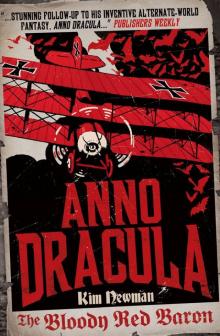 The Bloody Red Baron
The Bloody Red Baron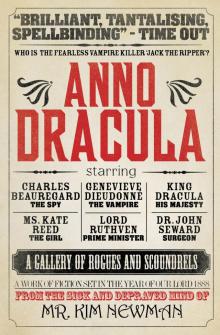 Anno Dracula
Anno Dracula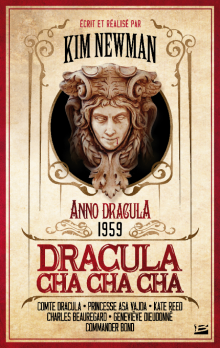 Dracula Cha Cha Cha
Dracula Cha Cha Cha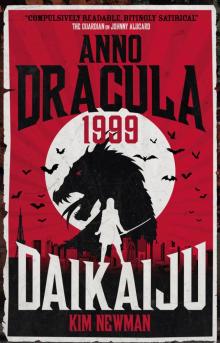 Anno Dracula 1999
Anno Dracula 1999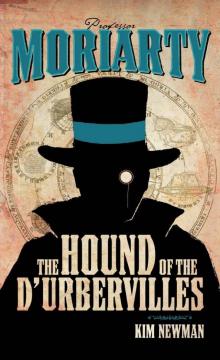 Moriarty: The Hound of the D'Urbervilles
Moriarty: The Hound of the D'Urbervilles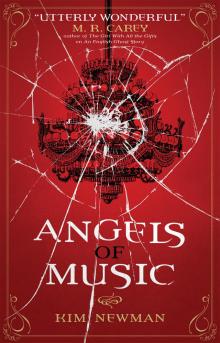 Angels of Music
Angels of Music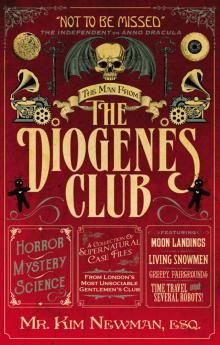 The Man From the Diogenes Club
The Man From the Diogenes Club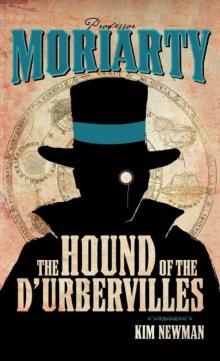 Professor Moriarty: The Hound Of The D’urbervilles
Professor Moriarty: The Hound Of The D’urbervilles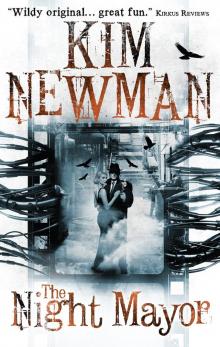 The Night Mayor
The Night Mayor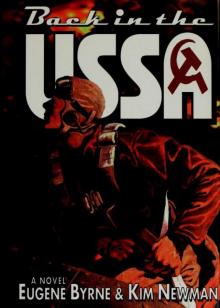 Back in the USSA
Back in the USSA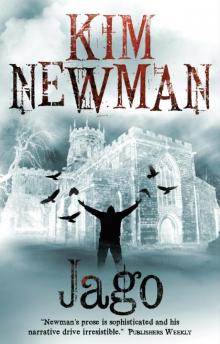 Jago
Jago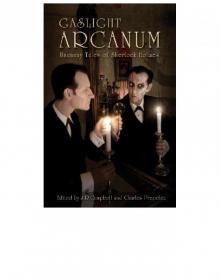 Gaslight Arcanum: Uncanny Tales of Sherlock Holmes
Gaslight Arcanum: Uncanny Tales of Sherlock Holmes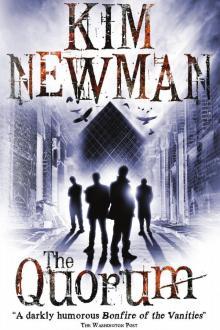 The Quorum
The Quorum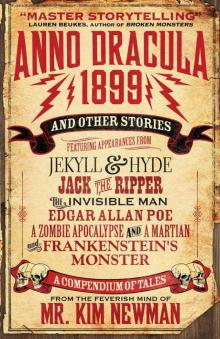 Anno Dracula 1899 and Other Stories
Anno Dracula 1899 and Other Stories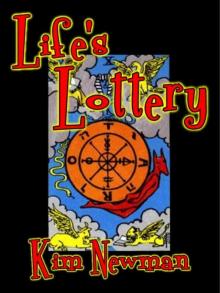 Life's Lottery
Life's Lottery The Secrets of Drearcliff Grange School
The Secrets of Drearcliff Grange School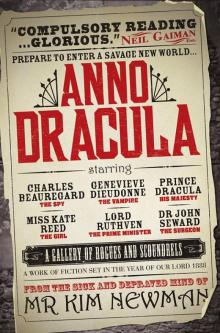 Anno Dracula ad-1
Anno Dracula ad-1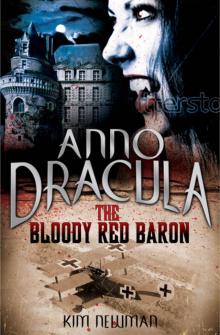 The Bloody Red Baron: 1918 ad-2
The Bloody Red Baron: 1918 ad-2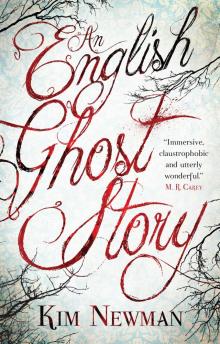 An English Ghost Story
An English Ghost Story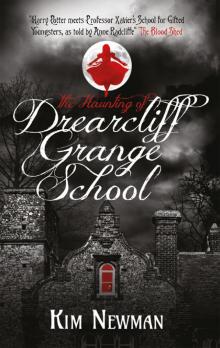 The Haunting of Drearcliff Grange School
The Haunting of Drearcliff Grange School The Other Side of Midnight
The Other Side of Midnight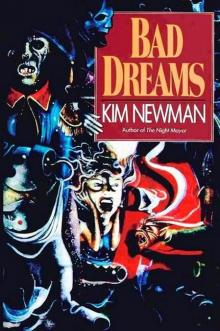 Bad Dreams
Bad Dreams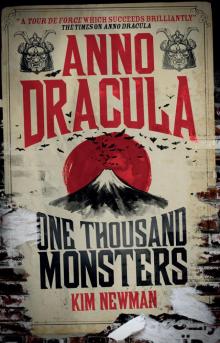 Anno Dracula--One Thousand Monsters
Anno Dracula--One Thousand Monsters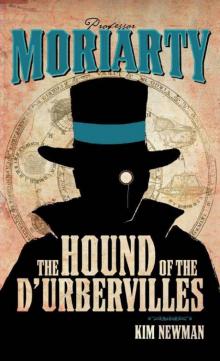 The Hound Of The D’urbervilles
The Hound Of The D’urbervilles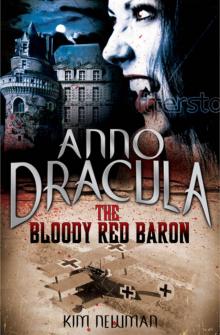 The Bloody Red Baron: Anno Dracula 1918
The Bloody Red Baron: Anno Dracula 1918